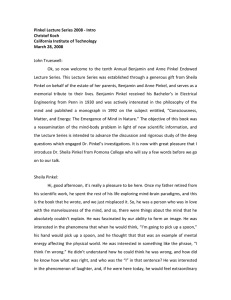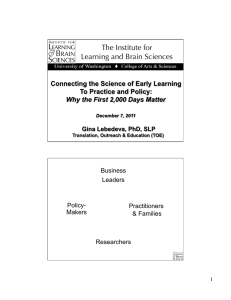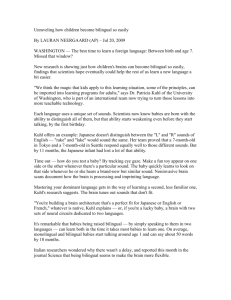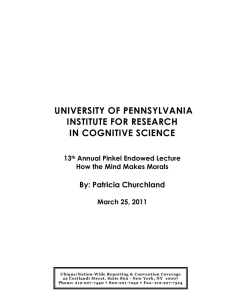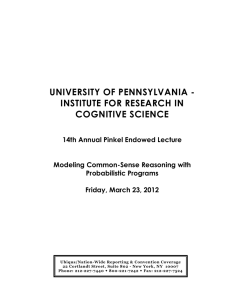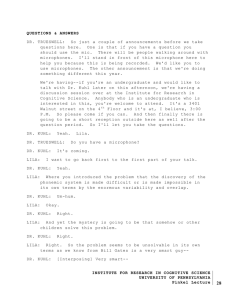SPEAKER INTRODUCTION Annual
advertisement
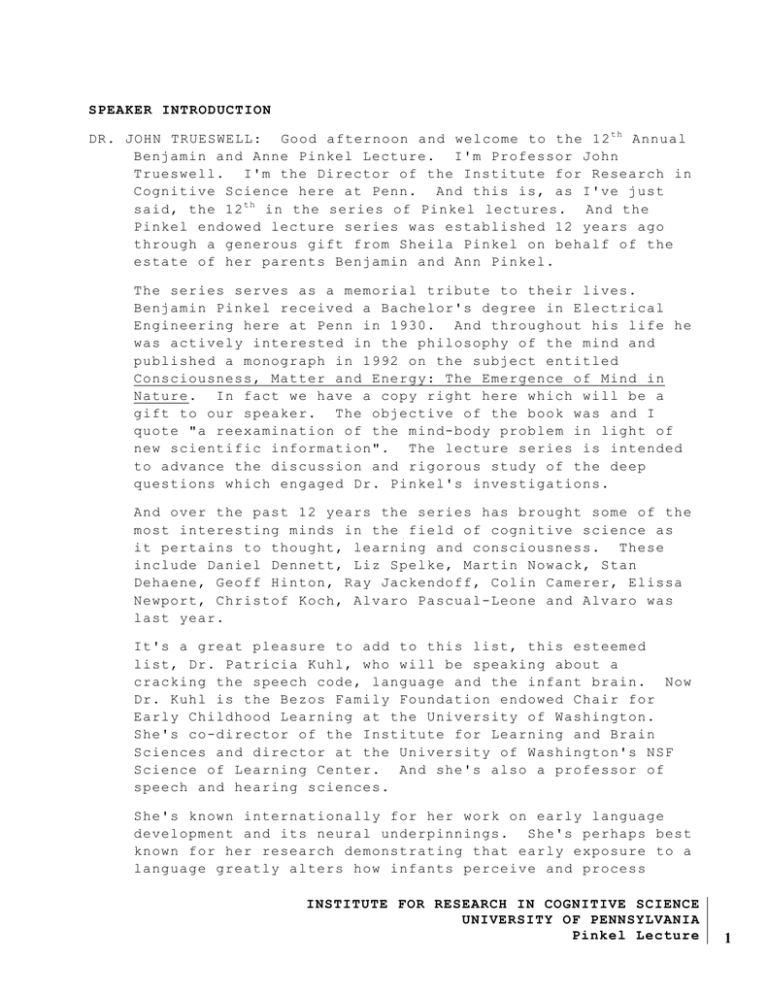
SPEAKER INTRODUCTION DR. JOHN TRUESWELL: Good afternoon and welcome to the 12 t h Annual Benjamin and Anne Pinkel Lecture. I'm Professor John Trueswell. I'm the Director of the Institute for Research in Cognitive Science here at Penn. And this is, as I've just said, the 12 t h in the series of Pinkel lectures. And the Pinkel endowed lecture series was established 12 years ago through a generous gift from Sheila Pinkel on behalf of the estate of her parents Benjamin and Ann Pinkel. The series serves as a memorial tribute to their lives. Benjamin Pinkel received a Bachelor's degree in Electrical Engineering here at Penn in 1930. And throughout his life he was actively interested in the philosophy of the mind and published a monograph in 1992 on the subject entitled Consciousness, Matter and Energy: The Emergence of Mind in Nature. In fact we have a copy right here which will be a gift to our speaker. The objective of the book was and I quote "a reexamination of the mind-body problem in light of new scientific information". The lecture series is intended to advance the discussion and rigorous study of the deep questions which engaged Dr. Pinkel's investigations. And over the past 12 years the series has brought some of the most interesting minds in the field of cognitive science as it pertains to thought, learning and consciousness. These include Daniel Dennett, Liz Spelke, Martin Nowack, Stan Dehaene, Geoff Hinton, Ray Jackendoff, Colin Camerer, Elissa Newport, Christof Koch, Alvaro Pascual-Leone and Alvaro was last year. It's a great pleasure to add to this list, this esteemed list, Dr. Patricia Kuhl, who will be speaking about a cracking the speech code, language and the infant brain. Now Dr. Kuhl is the Bezos Family Foundation endowed Chair for Early Childhood Learning at the University of Washington. She's co-director of the Institute for Learning and Brain Sciences and director at the University of Washington's NSF Science of Learning Center. And she's also a professor of speech and hearing sciences. She's known internationally for her work on early language development and its neural underpinnings. She's perhaps best known for her research demonstrating that early exposure to a language greatly alters how infants perceive and process INSTITUTE FOR RESEARCH IN COGNITIVE SCIENCE UNIVERSITY OF PENNSYLVANIA Pinkel Lecture 1 speech. Dr. Kuhl's many years of research have aptly demonstrated and I quote here from one of her papers "infants are born citizens of the world with regard to language. They can distinguish sounds from languages around the world even if they've never heard them before. By the end of the first year of life however they become language specialists and the ability to attend to sounds from foreign languages greatly diminishes as their native language abilities significantly increase." This is truly groundbreaking work that has shaped a generation of speech perception researchers, cognitive scientists and cognitive neuroscientists. And for this she has been internationally recognized in many ways. She's a member of the American Academy of Arts and Sciences, the Rodin Academy, the Norwegian Academy of Sciences and Letters. She was awarded the Silver Medal of the Acoustical Society of America in 1997. And in 2005 the Kenneth Craik Research Award from Cambridge University. She's a Fellow of the American Association for the Advancement of Science, the Acoustical Society of America, and the American Psychological Society. And in 2008 in Paris, Dr. Kuhl was awarded the Gold Medal for the Acoustics Branch of the American Institute of Physics. It's truly an honor to have Dr. Kuhl here as the 12 t h Pinkel lecturer. So please give a warm welcome to Dr. Kuhl. [Applause] INSTITUTE FOR RESEARCH IN COGNITIVE SCIENCE UNIVERSITY OF PENNSYLVANIA Pinkel Lecture 2
